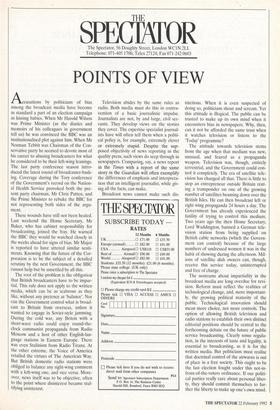The Spectator, 56 Doughty Street, London WC1N 2LL Telephone: 071-405
1706; Telex 27124; Fax 071-242 0603
POINTS OF VIEW
Accusations by politicians of bias among the broadcast media have become
as standard a part of an election campaign as kissing babies. When Mr Harold Wilson was Prime Minister (as the diaries and
memoirs of his colleagues in government tell us) he was convinced the BBC was an institutionalised plot against him. When Mr Norman Tebbit was Chairman of the Con- servative party he seemed to devote most of his career to abusing broadcasters for what he considered to be their left-wing leanings. The last party conference season intro- duced the latest round of broadcaster-bash- ing. Coverage during the Tory conference of the Government's record on the Nation- al Health Service provoked both the pre- sent party chairman, Mr Chris Patten, -and the Prime Minister to rebuke the BBC for not representing both sides of the argu- ment.
These wounds have still not been healed. Last weekend the Home Secretary, Mr Baker, who has cabinet responsibility for broadcasting, joined the fray. He warned the BBC they would be watched closely in the weeks ahead for signs of bias. Mr Major is reported to have uttered similar senti- ments. Knowing that the future of the Cor- poration is to be the subject of a detailed scrutiny by the next Government, the BBC cannot help but be unsettled by all this.
The root of the problem is the obligation that British broadcasters have to be impar- tial. This rule does not apply to the written media, which can be as scabrous as they like, without any pretence at 'balance'. Nor can the Government control what is broad- cast to Britain from overseas, unless it wanted to engage in Soviet-style jamming. During the cold war, any Briton with a short-wave radio could enjoy round-the- clock communist propaganda from Radio Moscow and a host of other English-lan- guage stations in Eastern Europe. There was even Stalinism from Radio Tirana. At the other extreme, the Voice of America retailed the virtues of The American Way. But British domestic radio stations were obliged to balance any right-wing comment with a left-wing one, and vice versa. More- over, news itself was to be objective, often to the point where disinterest became stul- tifying uninterest. Television abides by the same rules as radio. Both media must do this in contra- vention of a basic journalistic impulse. Journalists are not, by and large, civil ser- vants. They develop views on the stories they cover. The expertise specialist journal- ists have will often tell them when a politi- cal policy is, for example, extremely clever or extremely stupid. Despite the sup- posed objectivity of news reporting in the quality press, such views do seep through in newspapers. Comparing, say, a news report in the Times with a report of the same story in the Guardian will often exemplify the differences of emphasis and interpreta- tion that an intelligent journalist, while giv- ing all the facts, can make.
Broadcast news cannot make such dis-
tinctions. When it is even suspected of doing so, politicians shout and scream. Yet
this attitude is illogical. The public can be trusted to make up its own mind when it encounters bias in newspapers. Why, then, can it not be afforded the same trust when it watches television or listens to the `Today' programme?
The attitude towards television stems from the age when that medium was new, unusual, and feared as a propaganda weapon. Television was, though, entirely terrestrial, and the Government could con- trol it completely. The era of satellite tele- vision has changed all that. There is little to stop an entrepreneur outside Britain rent- ing a transponder on one of the growing number of satellites beaming down over the British Isles. He can then broadcast left or right wing propaganda 24 hours a day. The Government has already experienced the futility of trying to control this medium. Two years ago the then Home Secretary, Lord Waddington, banned a German tele- vision station from being supplied on British cable networks (which the Govern- ment can control) because of the large numbers of undressed women it was in the habit of showing during the afternoon. Mil- ions of satellite dish owners can, though, receive this service today, uninterrupted and free of charge.
The nostrums about impartiality in the broadcast media are long overdue for revi- sion. Reform must reflect the realities of technological change, and, more important- ly, the growing political maturity of the public. Technological innovation should mean more choice, not more controls. The option of allowing British television and radio stations to establish their own distinct editorial positions should be central to the forthcoming debate on the future of public service broadcasting. Clearly some regula- tion, in the interests of taste and legality, is essential to broadcasting, as it is for the written media. But politicians must realise that doctrinal control of the airwaves is out of place in a free society. This ought to be the last election fought under this not-in- front-of-the-voters ordinance. If our politi- cal parties really care about personal liber- ty, they should commit themselves to fur- ther the liberty to make up one's own mind.


















































 Previous page
Previous page